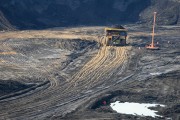Some of the facts in a report I authored were recently challenged. The report, Northern Lifeblood - Empowering Northern Leaders to Protect the McKenzie River Basin, investigated current and future threats to the basin, including the risks associated with the 170 square kilometres of toxic tailings lakes in the Athabasca watershed. And it's the facts surrounding those toxic tailings lakes that were questioned.
Our report findings are carefully referenced, citing government, industry and academic, peer-reviewed documents. Nonetheless, Suncor Energy raised concerns with our findings in a letter to the editor printed in the Edmonton Journal.
As we state in our report, there has been no successful reclamation of tailings to date. Suncor disputed this, claiming the company has "achieved a solid surface with its Pond 1." This claim requires context.
 While Suncor has already achieved a solid surface in one of its tailings lakes (Pond 1), this has been accomplished by transferring the liquid to other lakes. Moving tailings from one place to another is not a successful reclamation. It is like cleaning your bedroom by tossing everything in the living room.
While Suncor has already achieved a solid surface in one of its tailings lakes (Pond 1), this has been accomplished by transferring the liquid to other lakes. Moving tailings from one place to another is not a successful reclamation. It is like cleaning your bedroom by tossing everything in the living room.
Suncor also took issue with us citing a comprehensive report that noted tailings dams have a 10-fold greater probability of failure compared to conventional dams. The company notes that, "there is extensive engineering, monitoring and independent consultant and government review of oilsands tailings ponds." Unfortunately, our several attempts to access documents from government and industry relating to the status and performance of tailings pond dams and emergency planning were unsuccessful, indicating a clear example of lack of transparency.
My colleague, Nathan Lemphers, spoke to the attempts he made to access tailings lakes emergency plans in his recent blog post. He contacted Alberta Environment, Suncor Energy, Syncrude Canada, Shell Canada and the director of emergency services for the Municipality of Wood Buffalo — none of whom would provide him with the plans he requested.
 The estimates we published regarding seepage from tailings lakes were also questioned. The National Energy Board of Canada has stated "the principle environmental threats from tailings ponds are the migration of pollutants through the groundwater system and the risk of leaks to the surrounding soil and surface water." Furthermore, a 2008 report estimated that 11 million litres of contaminated water are seeping into the environment from tailings ponds every day.
The estimates we published regarding seepage from tailings lakes were also questioned. The National Energy Board of Canada has stated "the principle environmental threats from tailings ponds are the migration of pollutants through the groundwater system and the risk of leaks to the surrounding soil and surface water." Furthermore, a 2008 report estimated that 11 million litres of contaminated water are seeping into the environment from tailings ponds every day.
The fact that no hard data is available on the rates or the composition of seepage again points not to the fact that there is no seepage, but rather to a lack of transparency. We agree with Suncor that "responsible development of the oilsands requires ... transparent reporting" and commend the company on its industry-leading tailings efforts. Suncor is the only oilsands operator heading for compliance with the new Energy Resources and Conservation Board tailings directive that limits future tailings growth, but large challenges remain.
Downplaying, or ignoring unresolved tailings risks is not helpful at a time we need stronger policies and more publicly available information to inform responsible management.









